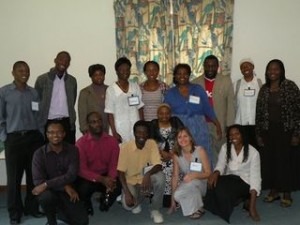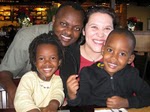
On Claude Nikondeha’s eighth birthday, his Tutsi family of eight moved to the slums of Bujumbura, Burundi, where his father, a Free Methodist pastor, was charged with planting a church.
“It was like a new day for me because up to that point we had lived in villages and the countryside,” says Claude. “And I didn’t know what poverty was because nobody had more than anybody else.”
Two years later, violence between Burundi’s Tutsi and Hutu ethnic groups escalated into a civil war that ended up lasting for 15 years.
“Each family could tell you this story, about [loved ones] that they lost,” Claude says. “I grew up with kids killing each other for school clothes, with neighborhoods completely shut down…When you grow up in a war zone, the only thing you know is fighting and hate and unforgiveness.”
Since the conflict between Hutus and Tutsis transcended the borders of tiny Burundi, Claude also grew up with and learned Swahili from Tutsi refugees from Rwanda and Congo.
“The challenging thing for me was that the world was falling apart all around us, the world as we knew it, but the church had absolutely nothing to say about it. And some of the people involved in collapsing the world were part of the church. I was confused along with quite a few people. As if there were two lives.
“When I went to talk to older folks who had been part of the church for a long time and asked them what God has to say about injustices and fighting and hostilities, the answer was always the same, ‘Don’t worry about it. We’re going to a better place where the streets are like gold and there are no tears.’ For me, at that point, it sounded like good news, because we lived in absolute poverty in a place where people were killing each other. But when I realized that it wasn’t happening any time soon, it ceased being good news for me.”
Leaving the war behind
Claude’s ticket out of war-torn Burundi was his study of communications, first at Université de Bretagne Occidental – Brest in Western France, and later, at Norwich University near the east coast of England.
“I have been extremely privileged and blessed, which unfortunately is not the case for 90 percent of the young people in Burundi, who didn’t have a path like I did.”
Claude came to the United States on a work visa, eventually becoming a regional director for the Salvation Army in Long Beach, Calif. In 1998, while speaking at a nearby conference on reconciliation, he met a master’s of theology candidate named Kelley Johnson. They married in 2002, and began their life together in Pasadena, Calif.
“We had good jobs and we were working and could have lived the American Dream,” Claude says. “But Africa was constantly in my mind. There’s the saying, ‘You can take the man out of Africa, but you can’t take Africa out of the man.’ So we decided I would take a trip to Africa.”
Finding hope
During his 2006 African tour, Claude visited six capital cities where he had local contacts—Nairobi, Kenya; Kampala, Uganda; Dar-es-Salaam, Tanzania; Kigali, Rwanda; Addis Ababa, Ethiopia; and Bujumbura.

“I would meet with a church leader, like an Anglican bishop, and say, ‘I’m here to meet the crazy people.’
“Define crazy,” the bishop said.
Claude responded, “People doing things the church would not do, resourcing people with dignity, ministering to the whole person and their family.”
The response was, “I know someone who fits perfectly.”
In Uganda, for example, he met a woman working with prostitutes in a red light district, and he met a man working with street kids out of his own home and using his own resources.
In all six cities, in fact, Claude found hope. “I found regular men and women doing remarkable things that were absolutely transforming their communities and the people and therefore the country.”
No longer alone
Claude’s tour forged in him a vision for empowering and encouraging grassroots leaders across Africa. “They all felt alone and they didn’t know if whatever they were doing was even Christian, because the churches around them weren’t doing anything remotely close to what they were doing.
“But I saw I could affirm them and connect them to a network of innovative leaders doing extraordinary things across the continent.”
Claude named the network “Amahoro,” a word in his native Bantu that can be translated, “peace.” In Swahili, the word is similar—“horo.” But like “shalom” in Hebrew, “amahoro” means not just “peace,” but “everything to do with peace and connection and wholeness.” Claude, who speaks Bantu, Swahili, French and English, refuses to do “amahoro” the injustice of chaining it to a dictionary, “It’s a much bigger word that you can’t define.”

It’s bigger, as in, the kind of bigger that accounts for Amahoro’s Burundi-based, 12-person staff team including Tutsis and Hutus. But it’s even bigger than that, because ethnic tension is often more symptom than cause of suffering.
According to Claude, “Most of the economic studies [of Africa], ignore that people are hungry and don’t see a way out. They will use whatever means to survive. Ethnic differences can be one thing that stirs up civil war, but economic and land and labor issues are underlying. They will use ethnic background as a cover up [for war], just like in Northern Ireland.”
Despite regularly confronting Africa’s complex problems, which seem to stretch as wide as Lake Victoria, Claude says, “It’s easy for me to stay encouraged…Like Barnabas, I get to go around encouraging these people, and I’m just humbled by their faith, their work, their courage, their determination. ”
This spring, Amahoro hopes to welcome more than 300 Africans—one-third of them pastors—to its fifth annual “Gathering” of emerging leaders.
The Nikondeha’s maintain a residence in Burundi so Claude can shepherd Amahoro’s growing network, but Kelley now spends most of her time with their two adopted six-year-olds, Justin and Emma, in Phoenix, Ariz., where it’s easier to get help with Emma’s hearing impairment and learning disabilities. For Claude, who regularly crisscrosses Africa already, his family arrangement means frequent, exhausting, 36-hour trans-Atlantic flights from Bujumbura to Phoenix. And that’s just one-way.
“The key is to get to where you can do what’s inside you and then let God multiply what you’re doing,” Claude says. “The extraordinary thing is to say ‘I’m going to do what I can with the means and the power and the resources I have, with what’s in front of me,’ and then let God do the rest.”
Visit Amahoro’s website for more information about their network of emerging leaders and how you can help it grow.


